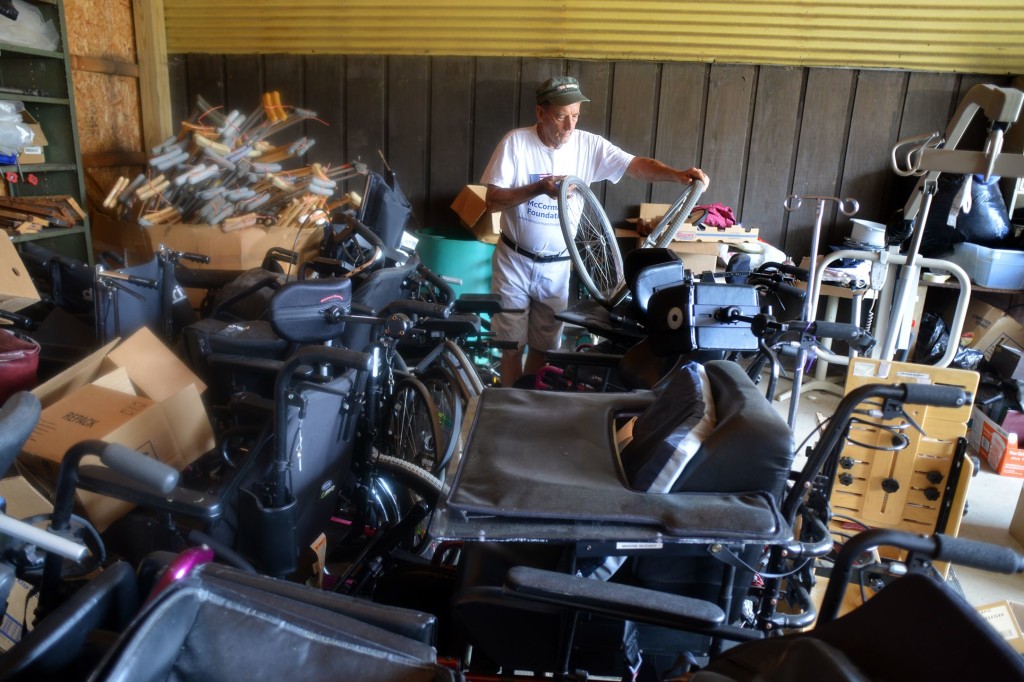This is a great story about a great guy who has been helping the people of Panama, those who cannot afford the gifts that he has brought here and continues to every year.
Frank Szuchy, of Ambridge, stopped by the “honey table” at the Ambridge Farmer’s Market. Like many people who come on seasonal Thursday afternoons, he had a mission greater than buying honey products. He came to donate a hospital bed, wheel chair and lift.
His wife died more than a year ago, and he had heard about the Panama McCormack Foundation that sends medical supplies to the impoverished areas of Panama.
“I just want to donate it. I went through some hard times, my wife sick and all, and I just want to help someone else,” he said in the shadow of the church he and his wife, Linda Kay, had been married in more than 40 years ago.
Tom McCormack, the beekeeper, and his wife, Linda, make arrangements to pick up large donations, but the honey table is the drop off spot for smaller items that include walkers, canes, nebulizers, breast prostheses/bras, or prosthetic arms and legs.
Mr. McCormack, 70, will depart, too, for a six-month stay in the impoverished country. His wife, Linda, will remain to tend the farm they have tended in Raccoon Townshp since 1977.
Medical equipment that is often discarded here is a great gift in Panama. Next month, Container no.16, filled with thousands of pounds of medical equipment, arrives in David, Panama.
The last container was shipped this past spring. “It needed 60 volunteers to load up the last container, and I had 72 hands to unload it in Panama,” said Mr. McCormack.
Mr. McCormack will spend six months there. While in Panama, Mr. McCormack will make prosthesis. It was the beekeeping that first brought him to Chiriqui, the westernmost province of Panama, in 1994. As a master beekeeper, he was part of the federal Farmer to Farmer Program in 1994 to help Panama beekeepers become more productive.
During one visit, he met a woman he said he will always remember.
“She always had her arm across her chest. I thought she couldn’t move it,” he said. “But her family told me that she walked like that because she had her breast removed. She didn’t have a prosthesis.”
There are no medical prosthetic clinics in David, Panama. Mr. McCormack set up the first clinic to make makes arms, legs and hands.
“I just made leg no. 296 on my last trip,” he said. An assistant he trained informed him she recently made no. 309.
Nearly 30 years ago Mr. McCormack began to learn how to make prosthetics when the couple’s son, Douglas, was 13 and diagnosed with a life-threatening cancer.
“Only three inches remained after his leg was amputated. Now he is 42, and he can control the swing of his leg with his Smart phone,” said Mr. McCormack.
Since his retirement in 2000, as an airline mechanic, Mr. McCormack spends six months of each year in Panama making prostheses. When he arrives, the container of medical supplies will have been off-loaded at Colon, along the Atlantic Ocean, and shipped by truck to David, the distance of Pittsburgh to Philadelphia.
Mrs. McCormack remains here to tend the farm and continue gathering medical supplies. Among the needed items: hearing aids, breast prostheses and prosthetic bras, prosthetic arms and legs, wheelchairs, home hospital beds, nebulizers, walkers, crutches and 4-footed canes.
“Anything medical we can use,” said Mrs. McCormack. For example, there are never enough breast prostheses.
“Here in America, the insurance companies replace such items as breast prostheses every few years. The inside gel doesn’t wear out, and as long as the outside is good, we can use it,” she said.
Other organizations help too, such as the Lion’s Club that collects eye glasses. The last shipment included a palette stacked seven feet high with thousands of eye glasses, as well as nearly 90 specialty wheel chairs and hundreds of walkers.
The gratitude of the people of Panama keeps him going for six months of each year.
“We never have anyone come to the shop sad. It’s water under the bridge with the amputation. They come to us with hope,” he said.
He has stayed in touch with the original woman who received the breast prosthesis. Since then she has received an implant.
It is the moving moments that keep him going on his trips. Mr. McCormack recalled the time he placed a prosthesis on a 40-year-old man who had a below-the-knee amputation.
“He got up got up and started walking. He did fine for three big steps. Then he bent over at 90 degrees — I thought he couldn’t get up or maybe had a heart attack.
”Then I saw that tears ran out of his eyes. ‘I never thought I’d walk, again,’”
